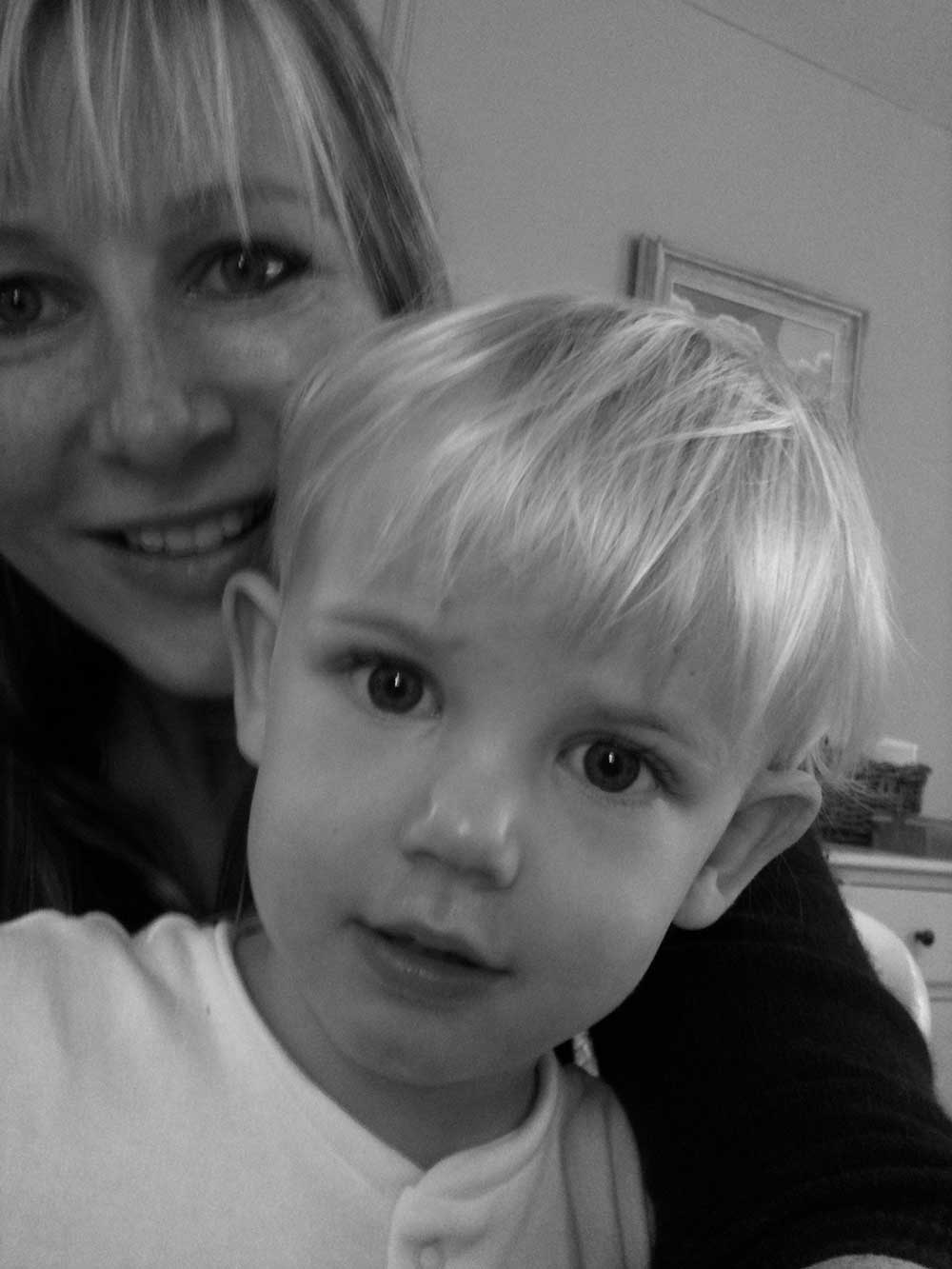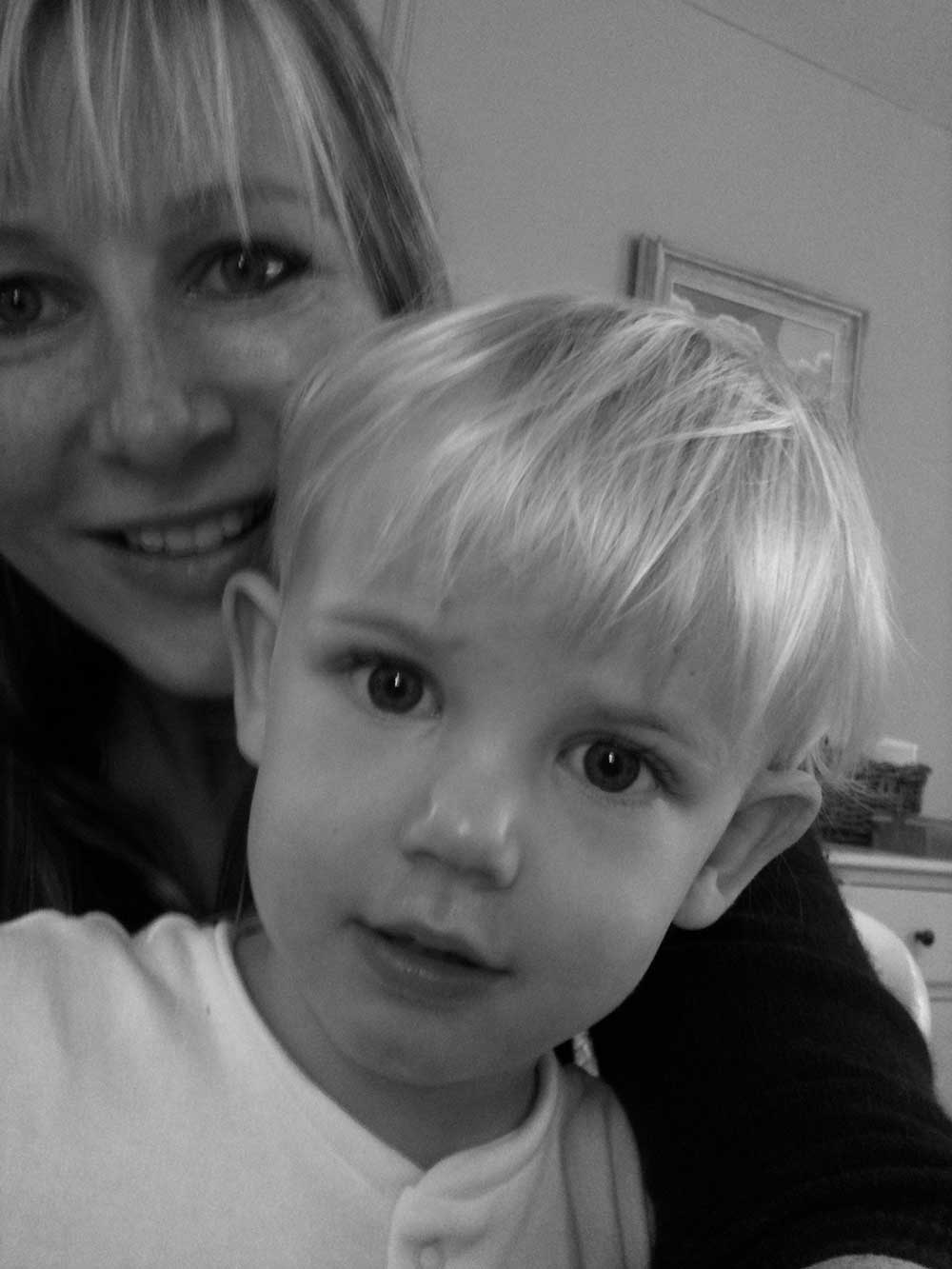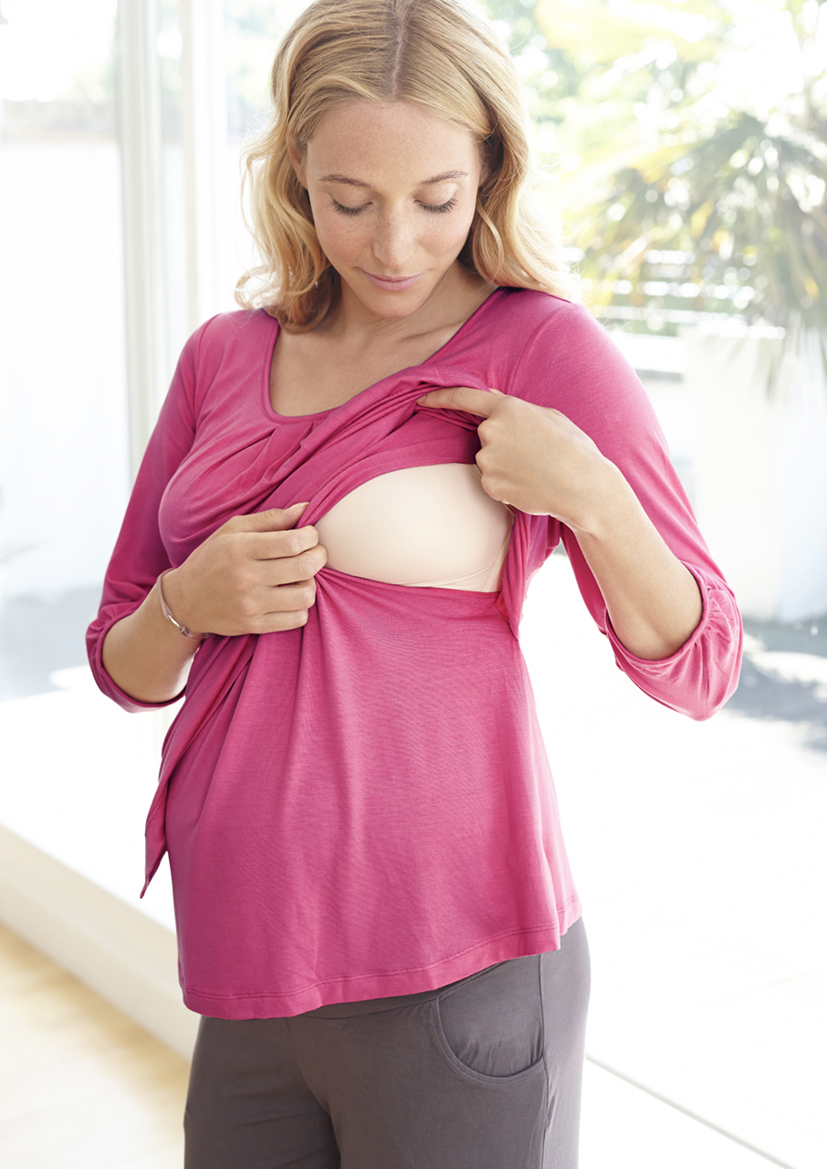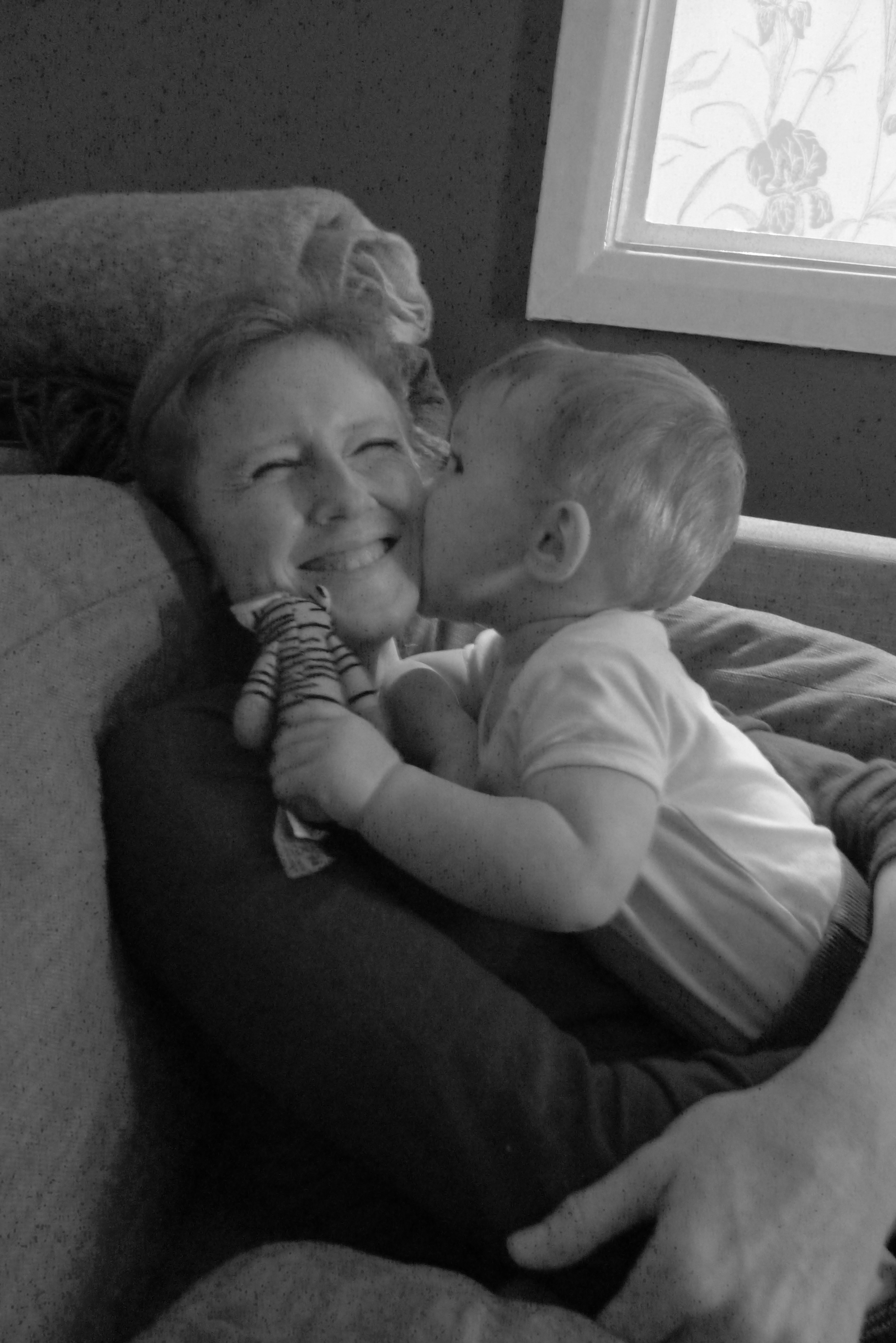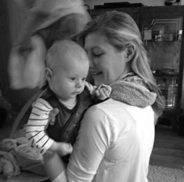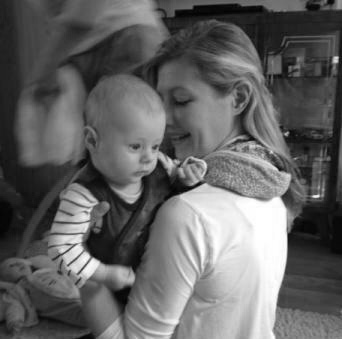The Mother of All sales – Black Friday staff picks
It’s the Mother of all sales and it’s only here for 24 hours. As experienced mums we only know too well how busy things get in the lead up to Christmas, so here’s our top picks on what to grab during our Black Friday sale.
A sleep bra. When your milk comes in, you’ll want to wear something super soft and incredibly comfortable, as you’re going to be extremely tender. It’s best to stay clear of underwires for the first 6 weeks of nursing, but it’s also important to find a bra that offers all of this at night too. Our Seamless Sleep bra has easy lift up nursing access, offers great support and also has a double layer at the front to hold breast pads (and trust us, you’re going to want to wear them at night too!)
Seamless Sleep bra £25 – Black Friday offer £17.50.
Nursing camisoles. These are so useful! They’re great to cover a new mum tum as well as providing easy nursing access. Go for something with an A frame, as this means you’ll have a bit more coverage whilst feeding in public. Our Seamless Nursing Cami has an in-built shelf bra to offer more support, or you can go for something a little more special like our Lace Trim cami, with easy side pull nursing access, (to tackle those 4am night feeds in style).
Seamless Nursing Cami £39 Black Friday offer £27.30
Lace Trim Cami £25 Black Friday offer £17.50.
It’s good to invest in some proper nursing tops, although these don’t necessarily have to be wrap-over. Choose a style that you actually like, as you’re going to be wearing it for quite a while (perhaps buy a couple in different colours so you have a few options). So many of our nightwear tops can also be worn in the day, and with our huge sale range on as well, today is the day to buy with some pieces going for up to 60% off!
Cloud 9 3/4 length sleeve nursing top £35 – £21 Black Friday offer £24.50 – £14.50
Button Nursing Top £35 Black Friday offer £24.50.
Get 30% off everything (including sale) by entering code BFS30 at checkout, 27/11/15 only.
Amoralia Review on Dress Like a Mum
We loved Zoe of Dress Like a Mum blog’s review of our maternity and nursing bra range! Read more about what she thinks of our pieces, including our new Allure set here.
“I have been wondering for a long time now, why no one has considered that pregnant and nursing mums want to have beautiful, comfortable, sexy, practical and stylish underwear.
Maternity and Nursing underwear feels like such an after thought for so many high street brands and as a result they have got it so wrong. Which is why it is great to see a company who is investing in research in this sector, who are really understanding what it means to be the woman wearing this underwear and therefore catering for it perfectly.
I am so happy to have discovered this brand. The underwear is stunning and super comfortable, it’s clever and innovative and I will be wearing my bra long after i finish breastfeeding.”
Three breastfeeding facts
Breastfeeding is a completely natural method of feeding your baby, so we think that it’s a shame that this natural, personal and private act has recently become sexualised and a debated topic.
Regardless of how you feel, women have been breastfeeding their young for centuries, and we hope that this long continues.
If you are pregnant and considering your options, did you know that:
Breastfeeding will help your baby to fight off infections
After a number of studies, scientists have found that breastfed babies can experience real short term benefits thanks to their mother’s milk. One of the many benefits include being fed antibodies via their mothers breast milk, helping to fight off nasties such as diarrhoea and chest infections.
Breastfeeding encourages skin to skin contact
When you nurse your baby, you will be bonding in a very effective way. Skin-to-skin contact is well known for its bonding powers as well as regulating temperature, soothing and helping to steady your baby’s breathing. Not only will your baby feel more at ease and calm, breastfeeding has the ability to help with postnatal depression.
Breastfeeding helps you to bounce back
By breastfeeding, you will be burning off calories from the comfort of your sofa! Breastfeeding will burn up to 500 calories a day, helping you get back into shape after pregnancy. However, it is advisable that you look at your diet whilst breastfeeding to ensure that you’re eating the right foods to make the best milk. Speak to your midwife if you want more information.
Final thought
Overall, having a happy and healthy mum and baby is the most important thing – the rest will all fall into place!
Image credit: https://farm4.staticflickr.com/3609/3467632119_d400447422_o_d.jpg
Giselle’s breastfeeding escapades…
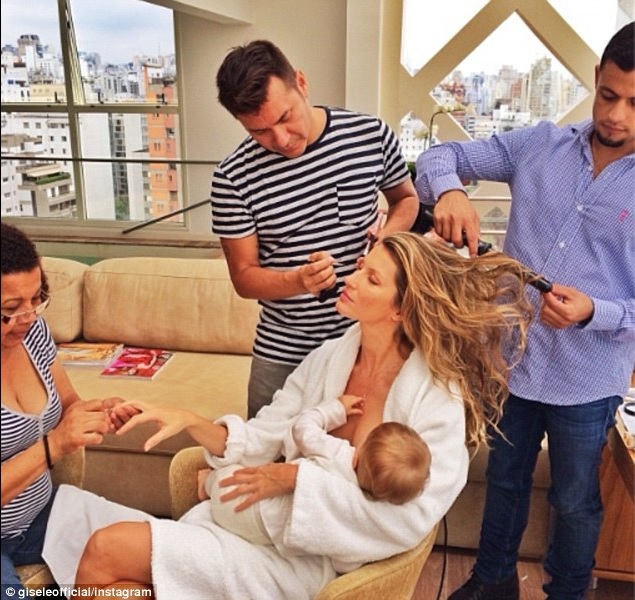 Have you seen this yet? We saw it on the Daily Mail website and it is definitely causing a bit of a stir. On the one hand it’s amazing that Giselle is promoting breastfeeding (especially extended breastfeeding, as Vivian has just turned one) but it also seems a little… ostentatious? Is that the right word? Perhaps ‘boastful’ is better!
Have you seen this yet? We saw it on the Daily Mail website and it is definitely causing a bit of a stir. On the one hand it’s amazing that Giselle is promoting breastfeeding (especially extended breastfeeding, as Vivian has just turned one) but it also seems a little… ostentatious? Is that the right word? Perhaps ‘boastful’ is better!
Very few women around the world have the opportunities that Giselle has – Jules certainly didn’t have anyone to do her hair, makeup and nails before work whilst she was breastfeeding! But we all know that being a celebrity is not about being normal, it’s about living a life that most people would envy and inform everyone of that fact, every step of the way. The photo seems like a reminder that life is full of moments that contradict each other and don’t really go hand in hand, yet we get on with them anyway.
It also seems very tongue in cheek, like Giselle is poking a bit of fun both at herself and those that view breastfeeding as ‘sacred’. The photo was posted to Instagram, the social media site notorious for people posting pictures of their food, so why should her photo of Vivian ‘eating’ be viewed any differently?
What do you think?
Image courtesy of the Daily Mail Online.
The ‘Pink Ladies’ and my fairy godmother of breastfeeding…
When I was pregnant with my first baby I was given all the information about breast feeding that mums-to-be are – the leaflets showing a good latch, the DVD with happy stories, the midwife telling me that I should breast feed – but I still really didn’t have a clue what to expect. Not even the knitted breast produced by the NCT tutor helped (can’t think why)! I suppose what all of that told me was that breast feeding is really important and you really should give it everything you’ve got. But what it didn’t tell me was how it would actually be.
So how was it… actually for me? So, I’d just gone through the most mind bogglingly massive event of my life – giving birth to my son. I was exhausted but elated… not really wanting to do anything ever again apart from lie still and gaze at the tiny new baby. Then the chirpy midwife says, ‘right, let’s get this baby feeding!’ What, now?! I know I’ve got to, but can’t it wait just a little… I don’t have a clue what to do and I’m knackered?!
It’s a strange feeling having your nipple manually handled into a baby’s mouth (a baby who, by the way, also didn’t have a clue what he was doing!). The midwife seemed to feel happy that we’d got a good ‘latch’ and we were happily discharged home just a couple of hours after the birth. But once we were home, I really didn’t feel confident that I knew how to feed this little person. It seemed to take ages to get him latched on to the breast, I couldn’t really tell if he was taking anything and my nipples were not appreciating all this attention. So much for all those gushy stories about breastfeeding! And then along came my fairy godmother – the amazing breastfeeding advisor who visited us at home and actually helped my son and me to find our own technique that worked for us without the need to tweek or prod or belittle. She kept popping in or calling until she was sure that my confidence levels were up. And my confidence levels did increase, as did, gradually, my enjoyment of breastfeeding.
But that’s not to say that the early weeks of breastfeeding suddenly became a doddle. I remember aches and pains and bleeding nipples (on that note, there was a scarey day when I saw blood in my baby’s milk sick, then worked out it wasn’t him, it was blood from my nipple in the milk… phew!). So when I hear people saying that breastfeeding is easy or pain-free, for those early weeks, I really can’t agree. But I would agree that if you and the baby manage to keep going with it, it does get easier and eventually it becomes a pleasure.
I was lucky. My body managed to produce enough milk for my son, he managed to sort out how to feed and between us we kept breastfeeding for 13 months. So I became a fan of breastfeeding. But equally I would always say to friends who ask about it that of course, as a mum, you’re trying to do everything that’s best for your baby… but you’ve also got to look after yourself. And if breastfeeding isn’t working out for whatever reason, then surely an exhausted, stressed out mum isn’t best for baby?
Katie is a speech therapist and mum to Rowan, 3 and Isla, 22 months
Just a little note – the ‘breastfeeding advisor’ that Katie refers to is one of the ‘Pink Ladies’ who help new mums in the North East Essex area, around Colchester and Tendring. They are all trained to UNICEF Baby Friendly standards. If you live in this area, call their Breastfeeding Support Line on 01255 202714.
Katie will also be writing a part 2 for us, about her experiences with a tongue-tied Isla, her (real) top tips for breastfeeding and what she expects for baby number 3!
discrete breastfeeding… in public!
Considering the focus on breastfeeding in the media recently, we thought we’d give you a few fashion tips. So here are 3 casual (but not too casual) outfit ideas that you will feel comfortable wearing to breastfeed in public. You’ll be running all over the shop in the run up to Christmas, we’re sure, but you still want to look fab!
Our Cloud 9 ¾ sleeve nursing top is so functional and it comes in 4 colours (ivory, pewter, cerise and blush, above) so you have plenty of different options. As you can see from the moodboard, you can take it from lounging around the house, to coffee out with friends, to meeting the inlaws, all with minimal stress. With easy nursing access (see the picture below) and our signature super soft fabric, you won’t want to miss out on this one.
So what else did we use? Take a look below:
Amoralia’s Cloud 9 ¾ sleeved nursing top in blush, £35, here
Nighttime outfit
Amoralia’s Second Skin Organic sleep/yoga bra, £29, here
Amoralia’s PJ Pants with Pockets, £39, here
Amoralia’s Muslin, £3, here
Ugg Australia’s ‘Classic’ short boot, £130, here
NCT Coffee & Chat outfit
Amoralia’s Second Skin nursing bra, £30, here
J Brand’s Mama Maternity Skinny Jean, £162.73, here
Toast’s Light Parka Coat, £129, here
White Stuff’s Marlene socks, £6, here
Meeting Granny & Grandpa outfit
Amoralia’s Cupcake nursing bra, £35, here
Yummy Mummy Maternity’s thick cotton maternity tights, £14, here
Topshop’s maternity tube skirt, £25, here
Hush textured shawl, £45, here
StorkSak’s Tote changing back, £70, here
Lots of love, Jules and the girls at Amoralia x
I breastfed for 14 months, but…
I got off to a slippery start with breastfeeding. Literally – my son would only latch onto one side, so three days in I had one functioning breast and one football. Every time I presented it to the poor mite he would just slide off. Then I went to a breastfeeding clinic and a lovely, no-nonsense lady called Linda pummelled it into submission. It was one of those agonies that seems small in the mind-bending few weeks after birth. Though it was a relief to have him feed from both sides, I do remember it being uncomfortable for the first month, with that needling pain that curls your toes.
Still, it worked pretty well after that. There is something wonderful about knowing you can feed your baby absolutely anywhere with no preparation. We fed on the bus, in the Groucho, on a hillside, even – in a moment of desperation – on a bench outside a pub one winter’s evening. But we also fed a whole lot in the middle of the night. In fact Benjy didn’t sleep through till I stopped breastfeeding, at 14 months.
Life with no sleep was so terrible that I resolved not to do it for so long if there’s a next time. I have no problem at all with formula; I think breastfeeding is unreasonably overhyped at the moment. I just thought I could avoid all the faff of measuring and sterilizing by nursing through to a year, when we could move onto cow’s milk. You never quite know what will work for your child – perhaps it was the new physical activity of being a toddler that made him sleep for longer, rather than the withdrawal of the prospect of night feeds. I don’t want to lay all the blame on my boobs, enticing as they may have been. And yes, I use the past tense intentionally. Health benefits aside, all that suckling has taken its toll.
Lily Williams is a film producer and is mum to Benjy, 21 months.
Breastfeeding – wow, I didn’t realise how hard it would be.
And this coming from someone who’s been plugged into that whole world for the last 7 years… When I was pregnant with Sacha, I was determined to breastfeed for at least 6 months (the health benefits, the bonding, the flexibility), but the reality is that we only managed 4 weeks. And those weeks were tough. I was absolutely exhausted, which meant that my milk supply became very low. The stress of seeing my baby’s weight plummet (he went from the 50th to the 2nd centile), made me even more anxious, and the raised adrenaline decreased my milk production even more. But I soldiered on as I felt incredibly intense guilt about ‘giving up’. That wretched protestant work ethic!
Switching to formula was no quick fix. He had terrible reflux, bottle would go down, bottle would come up. So I wouldn’t ever really ‘know’ how much he had taken (one of the supposed benefits of bottle vs breast). Getting up, boiling the kettle, fannying about with formula twice a night was definitely more tiring than rolling over and getting him to latch on. But ultimately, my baby wasn’t hungry any more, and was putting on weight, and that’s what mattered.
With time, the guilt dissipated as I saw how close we became, and the health benefits, well… it’s worth reading this: Is Breast Not Best? and making your own mind up about it.
But… would I try again if we have a second baby? Definitely.
Guest post: Penny Alexander on the UNICEF breastfeeding research
UNICEF report reveals the cost of failing to support women to breastfeed
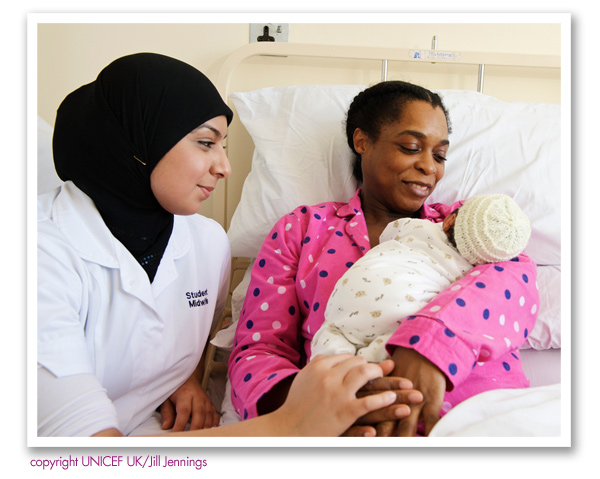 New research by UNICEF has revealed the staggering cost, to women, to babies and to the NHS, of not supporting women who want to breastfeed. I was asked to be among the first to share these findings over on my blog Alexander Residence and I am pleased to be able to share the on the Amoralia blog too. Basically the report suggests moderate increases in breastfeeding could reduce thousands of illnesses and in turn potentially save the NHS an estimated 40 million pounds a year, possibly in as little as one year.
New research by UNICEF has revealed the staggering cost, to women, to babies and to the NHS, of not supporting women who want to breastfeed. I was asked to be among the first to share these findings over on my blog Alexander Residence and I am pleased to be able to share the on the Amoralia blog too. Basically the report suggests moderate increases in breastfeeding could reduce thousands of illnesses and in turn potentially save the NHS an estimated 40 million pounds a year, possibly in as little as one year.
Breastfeeding is an emotive topic, but for once this report isn’t about making women feel guilty. The Infant Feeding Survey indicates 90% of women who stopped breastfeeding in the first six weeks discontinued before they wanted to. Many of those women could have continued to breastfeed with the right support, from health workers, from wider society. We have one of the lowest rates of breastfeeding in the world, the UK is still failing to support women who want to breastfeed. UNICEF want the government to see breastfeeding as a public health issue.
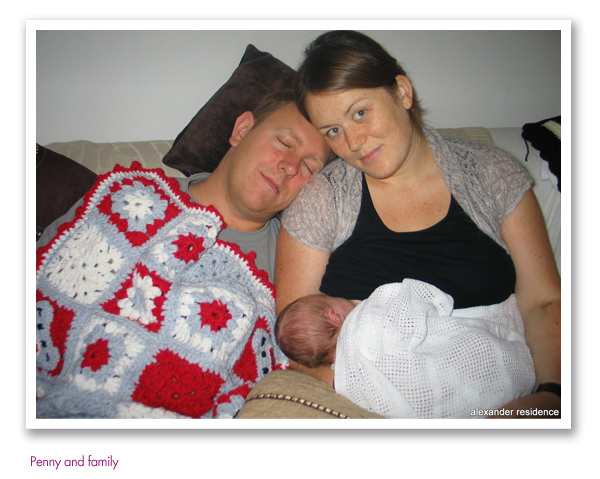 UNICEF’s researchers, from universities across the UK, identified all the illnesses with links to breastfeeding, they then focused simply on the 5 illnesses where evidence of the positive effects of breastfeeding are strongest (breast cancer in the mother, and gastroenteritis, respiratory infections, middle ear infections and necrotising enterecolitis (NEC) in the baby).
UNICEF’s researchers, from universities across the UK, identified all the illnesses with links to breastfeeding, they then focused simply on the 5 illnesses where evidence of the positive effects of breastfeeding are strongest (breast cancer in the mother, and gastroenteritis, respiratory infections, middle ear infections and necrotising enterecolitis (NEC) in the baby).
The report then translated moderate increases in breastfeeding into health benefits for mother and baby, and into 40 million in savings for the NHS:
If half those mothers who currently do not breastfeed were to do so for up to 18 months over their life (e.g. 9 months per child for two children), there would be:
The report is the tip of the iceberg, there are many more chronic conditions, responsible for significant amounts of NHS budgets, such as heart disease, cancers, diabetes, asthma, where breastfeeding is linked to reduced incidence. More research is needed to comment on how significant an impact breastfeeding could have in these areas.
After I read the report I reflected on my own experiences. I might have spent 90 hours in labour, I might have had 2 emergency C sections, but I was incredibly lucky with support when it came to breastfeeding. I had amazing hospital staff and daily midwife visits for the first week, they taught a very tired, emotional and shell shocked me how to feed my baby.
It helped I’d had breastfeeding passed down to me by my mum, that I was surrounded by completely supportive friends and family. I also live in one of the highest concentrations of under fives in the UK, breastfeeding is a very normal sight.
Talking to new mums now, I realise what I thought was ‘normal’ just isn’t, daily midwife visits don’t exist in some areas, women are still made to feel really uncomfortable about breastfeeding, the media still undermines breastfeeding, and the right advice, which could fix so many problems, isn’t readily available.
UNICEF are now calling for government and policy makers to recognise breastfeeding as a major public health issue. UNICEF want to ensure sufficient levels of well qualified staff in the NHS and consistent good quality support services.
UNICEF want legislation to tighten the law and prevent formula companies undermining breastfeeding, urgent research into how breastfeeding helps protect against some of the big killers like heart disease and diabetes, and campaigns to raise awareness of the health benefits.
Preventing Disease and Saving Resources: potential contribution of increasing breastfeeding rates in the UK, was carried out by a multi-university academic team including Dundee University, Oxford University, University of York, Brunel University, and St George’s, University of London, as well as the National Childbirth Trust.
Guest post: Anna, becoming a Breastfeeding Peer Supporter
Amoralia recently ‘met’ Anna, randomly, via a twitter conversation about becoming a Breastfeeding Peer Supporter.
We asked Anna if she could tell us how she got involved with this, and why…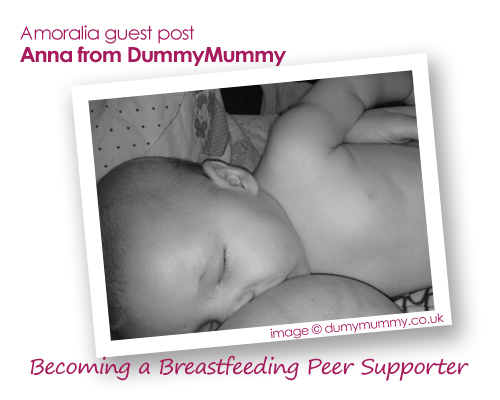
Anna writes:
Today was an exciting day for me. I started a Breastfeeding Peer Supporter course. This was a fairly big deal for two reasons.
1) I am fairly passionate about breastfeeding and…
2) When The Princess (my 2 year old daughter) was born I had a difficult time with anxiety and depression. I rarely left the house by myself, and the only group I really took part in was a six-week baby massage class, which was usually precluded by tears and arguments fuelled by fear and panic. By the time I was in a position to go to the local breastfeeding support group, I was back at work and the day the group was held inevitably clashed with the days I worked. So despite my enthusiasm for breastfeeding, I’ve never been involved in a real life breastfeeding group.
But today that changed. I met a truly lovely group of mums, all with different stories and reasons for wanting to become Peer Supporters, but all with a passion and desire to promote breastfeeding.
The area in which I live is not the most affluent, to put it mildly. Unemployment rates are high, educational standards are low, and there are a high number of young mums. According to the NCT, these factors are likely to mean that breastfeeding is less likely to happen. I learned today that in this area, only around 60% of new mums attempt to breastfeed, which is 20% lower than the national average. By the time the baby is six weeks old, only 30-40% are still being breastfed, 5-15% below the national average. This is why I was so upset when the government decided to cut the funding for National Breastfeeding Awareness Week last year, and why I feel so privileged to be able to undertake this Peer Supporter course. The necessary support for mums who want to breastfeed, and the message of how good breastfeeding is for mum and baby, just obviously aren’t reaching enough new mums in this city. In fact, these figures show that support and information are obviously lacking nationwide, given that over 80% of new mums begin breastfeeding, but just over half manage to continue beyond six weeks.
Over the next seven weeks, I’m looking forward to hearing about the breastfeeding experiences of other mums, to learning about providing support, and to learn more about the benefits of breastfeeding. I’m very excited about my journey towards becoming a Breastfeeding Peer Supporter, and feel very honoured to have been given this opportunity.
Additional reading: NCT’s PDF on Baby Feeding Statistics from the 2010 Infant Feeding Survey
Anna tweets at @annadummymummy and writes a wonderful blog over at www.dummymummy.co.uk






